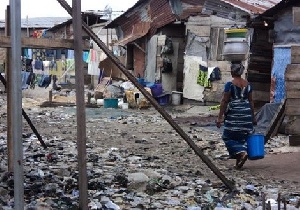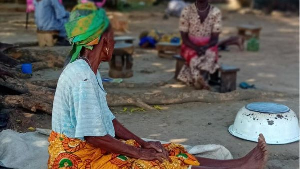The axiom that cleanliness is next to Godliness is mostly an espoused and used phrase by most Ghanaians in their daily lives. It has also been said many times that sanitation is a shared responsibility. The sense in this axiom is that as a people we have a role to play to ensure that every part of this country is clean.
The subject of sanitation in Ghana has been publicized severally by the media so much that it appears to be a cliché or an overburdened topic.
It’s of no argument that a lot of improvement has been made over the past decades or so to give our country, especially the regional capital cities a new look and to beautify them. Nevertheless, there is still a lot of work to be done in the critical area of sanitation.
A clean environment definitely will keep us all healthy and safe from diseases including cholera outbreak, malaria, typhoid, fever, bubonic plague and other communicable diseases. Ensuring that our environs are clean should not be left only to government or sanitation agencies. We must all play a part—for after all we contribute to the generation of waste both solid and liquid.
It’s therefore imperative to commend the current and previous governments for realising the enormity and urgency of the problem and initiating steps to better the situation. The metropolitan municipal and district assemblies (MMDAs), should be commended for its laudable efforts to breathe sanity into the running of affairs of the country.
Ensuring that our environs are clean should not be left only to government or sanitation agencies. We must all play a part—after all we contribute to the generation of waste.
Lack of proper sanitation can lead to the outbreak of diseases. A clean environment will keep us all healthy and safe from diseases including cholera, malaria, typhoid fever, bubonic plague and other communicable diseases. The onset of such diseases reduces the image of the country and may also affect GDP as it reduces man hours caused by illness. Poor sanitation in Ghana may also negatively affect tourism.
In the global front, we are frequently reminded of cities such as Bombay, Delhi and Beijing being some of the most polluted and congested cities on earth. However, we are also told that these cities are exceptionally beautiful and clean, except for vehicular traffic which is appalling.
Suffice to say that Ghana should not be allowed to graduate into the ranks of the most congested or dirtiest cities on earth. Unfortunately, Ghana has slipped further on its sanitation performance globally to become the world’s 7th worst performing country according to a The Joint Monitoring Programme report.
The report themed: “Progress on Sanitation and Drinking Water: 2015 Update and MDG Assessment,” which is a collaborative effort between the World Health Organisation (WHO) and the United Nations Children’s Fund, says that the challenge to assess improved sanitation is starker in Ghana.
It pointed that, Ghana was ranked the 10th worst country in the previous report, which indicated that its performance on sanitation coverage has worsened in the past year, Chief of WASH (water, sanitation and hygiene) at the UNICEF office in Ghana, Mr. David Duncan, told the Daily Graphic.
To change Ghana’s current status as one of the world’s worst performing countries in sanitation coverage, Mr. Duncan said there was the need for more investment in the sector. “At the moment there is a broader sanitation model and strategy, which is rolling out and that will help drastically but we need more investment in sanitation and the challenge is that we commitment,” he said.
Ghana, which currently has a sanitation coverage of 15 percent, is ranked after South Sudan, which has a 7 percent coverage, Niger, 11 percent, Chad, Madagascar and Togo, 12 percent each and Sierra Leone which has a 13 percent access to household toilets, the measurement used for the ranking.
It means to say that even after the declaration of every first Saturday of each month as a National Sanitation Day following the unforgettable cholera outbreak that claimed over 150 lives in Ghana that year, Ghana is still lagging behind in terms of attaining its target.
Three years down the line, the day has escaped the memory of almost everyone and the issue of sanitation somehow has been relegated to the background among the public.
The question one is tempted to ask is: whether there was ever the need to declare a single day in a whole month as a day for promoting sanitation. Such a declaration eminently proclaimed sanitation as an event rather than an overarching systemic thinking that people needed to buy into.
According to the World Health Organisation (WHO), “sanitation generally refers to the provision of facilities and services for the safe disposal of human waste. The word sanitation also refers to the maintenance of hygienic conditions, through services such as garbage collection and wastewater disposal.”
This definition of sanitation is important not only because it comes from a global watchdog of health like the World Health Organisation but because it identifies the three important components of sanitation—human, solid and liquid waste.
Regardless of a national sanitation day or any measure put forward to address the problem of sanitation, it has to be understood that sanitation is a critical need that has skipped the majority of Ghanaians.
Since Ghana gained independence 60 years ago, it is unfortunate to know that the total sanitation coverage in Ghana has not exceeded 15% for a long time.
This means that only 15 in every 100 Ghanaians have access to sanitation facilities and services while the majority are left defenseless against the inevitable challenge of disease.
Another report released by the United Nations Children's Fund (UNICEF) indicated that Ghana loses in excess of over $290 million dollars yearly to poor sanitation. According to the report, these monies are being spent on cost of spending on clearing huge refuse within cities and health care as a result of the country's sanitation problems.
It’s of this reason why government must rather spend more to provide citizens with improved sanitation than having to spend more in an attempt to cure the damage done by poor sanitation.
This means more cedi allocations for more toilet facilities, more urinals, more sewage systems, more septic tanks and more treatment machinery in the face of an ever-increasing population.
Most importantly, any sanitation intervention must end in making the waste disposed usable. In view of this, government must commit to making room for new technologies to treat and recycle waste.
In this regard, solid waste collected and deposited at designated dumpsites, the faecal matter in our toilets as well as wastewater collected should all be treated and reproduced for use in various ways.
The disposal of human waste into the sea and Lavender Hill should be replaced with more hygienic engineering technologies for their treatment and recycling.
There are lots of ways to deal with the devastating problem of poor sanitation in the country. We can look at first changing attitudes towards keeping the environment clean and free from filth. Families can participate by enlightening their members on the dangers of filth in the environment.
Educational institutions can also do more by educating students on sanitation and its importance, and then we can think of getting landfills at appropriate places where waste can be dumped in a safe way.
We can look at also getting effective punitive laws that will put people on their feet and force them to do the right thing. There is the recycling factor to consider and a lot more than we are doing as a country.
Ghana can become beautiful if we all sit up to help stop the situation of poor sanitation in this country.
Opinions of Wednesday, 8 November 2017
Columnist: Francis Tawiah















